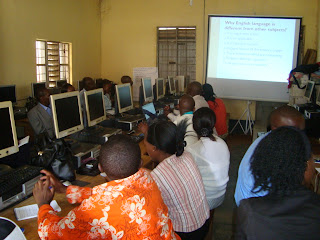Plants clinic activities rocked
high during the farmer’s market information symposium. This was realized during
the market information symposium held from 24th-25th at
Kisinga play ground Kisinga sub county Kasese district. This was the second
symposium of its kind in Uganda, it’s meant to bring buyers and farmers
together. The symposium was co-organized by RIC-NET and KRC with support and
funding form FIT Uganda and Agric-Pro-focus Uganda. The theme of the symposium
was “promoting farmers entrepreneurship
through the provision of sustainable market information services to enhance
competitive trade”. Agric-Pro-Focus work with individuals, groups,
companies and organizations like HIVOS, SNV and Oxfam working in the
agriculture sector.
Plant doctor were able to attend to 372 farmers for two
days. The Doctors were Mr. Asaba Wilberforce, Ms. Biira Astaluzi, and Ms.Walina
Juliet who operate daily in the markets of Ksinga, Mpondwe and Kinyabisiki
respectively in Bukonzo County in Kasese district.
Below is the summary
of what happened at Plant clinic stole.
|
|
|
Number of farmers involved.
|
|
|
|
Crop samples
|
Disease
and symptoms identified
|
Female
|
Males
|
Total
|
|
Beans
|
Leaf wilting, Injury o leaves, Growing points etc due to feeding
damage
|
121
|
46
|
167
|
|
Maize
|
Leaves: vein yellowing, inter-vein yellowing, leaf yellowing, yellow
blotching of leaves, yellow mosaic of leaves, leaf curling, leaf crumpling,
leaf vein thickening, leaf elations, leaf cupping,
|
122
|
71
|
191
|
|
Banana
|
Banana bacterial will, with yellowing of leaves and stunted growth.
|
89
|
172
|
161
|
|
Cocoa
|
Seeds on flower covered to dark spore mass
|
23
|
44
|
67
|
|
Ground nuts
|
Stunted growth and yellowing of leaves. Nematodes and fungus on the
leaves
|
111
|
79
|
190
|
|
Mangoes
oranges
|
Falling down by ripening, others splitting leave large opening.
|
34
|
41
|
75
|
|
pawpaw
|
Bacterial and fungus
|
02
|
09
|
11
|
|
cassava
|
Cassava mosaic begomo viruses.Symptoms;Stunting,Mosaic,Choloris Leaf distortion, ‘Candle stick
|
135
|
69
|
204
|
|
pineapple
|
Stunted growth
|
17
|
45
|
52
|
|
Cabbages
|
Bacterial, warms, fungus and nematodes.
|
21
|
09
|
30
|
|
Other vegetables.
|
silvery, curved larval mines on leaf underside, Leaf shedding,
feeding tunnels visible on the stems, Leaf yellowing, Stunted growth &
eventual mortality
|
34
|
11
|
45
|
Note: These
figures depend on the information the farmers were giving to the Plant Doctors
during the entire exercise. The figures apply to particular crop(s) on the prescription
form(s) from the Plants Doctors during the two day market information
symposium.
 |
| Asaba Wilberforce Plant Doctor in white court attending to mangoe farmers |
According to the chairperson LC III Kisinga sub county Mr.
Chance Kahindo, mentioned that “this is a big relief that NGO’s have come in to
supplement the work the government had intended to do but due to other factors
it has not been done”. Farmers have most often been frustrated by pests and
disease which have led to low output per acre. Farmers too expressed their heartfelt
gratitude to these plant doctors have are volunteering to offer service to the
farmers. “it was not heard off that plants can also be taken to the clinic”. They
thanked RIC-NET for giving these people knowledge and skills to help.
 |
| tomatoes in the market |
The
chairperson LCV Kasese on the same stole mentioned that farmers should utilize
these people well, support them.
However these plants Doctors who have for the past 2 years
been helping farmers voluntarily are not facilitated to keep moving from
village to village educating farmers on better and improved methods of farming.
Some time they have received resistance from some local government personally
thinking they are disrupting their activities. Some farmers mentioned that it
would be ideal for the government to take on plant clinic activities and those
that have already done the work and have the skills should be give the chance
and opportunity to work with the farmers at the grass root level. Could this be
a thought by the Kasese District local government to take on Plant Clinic
activities?








